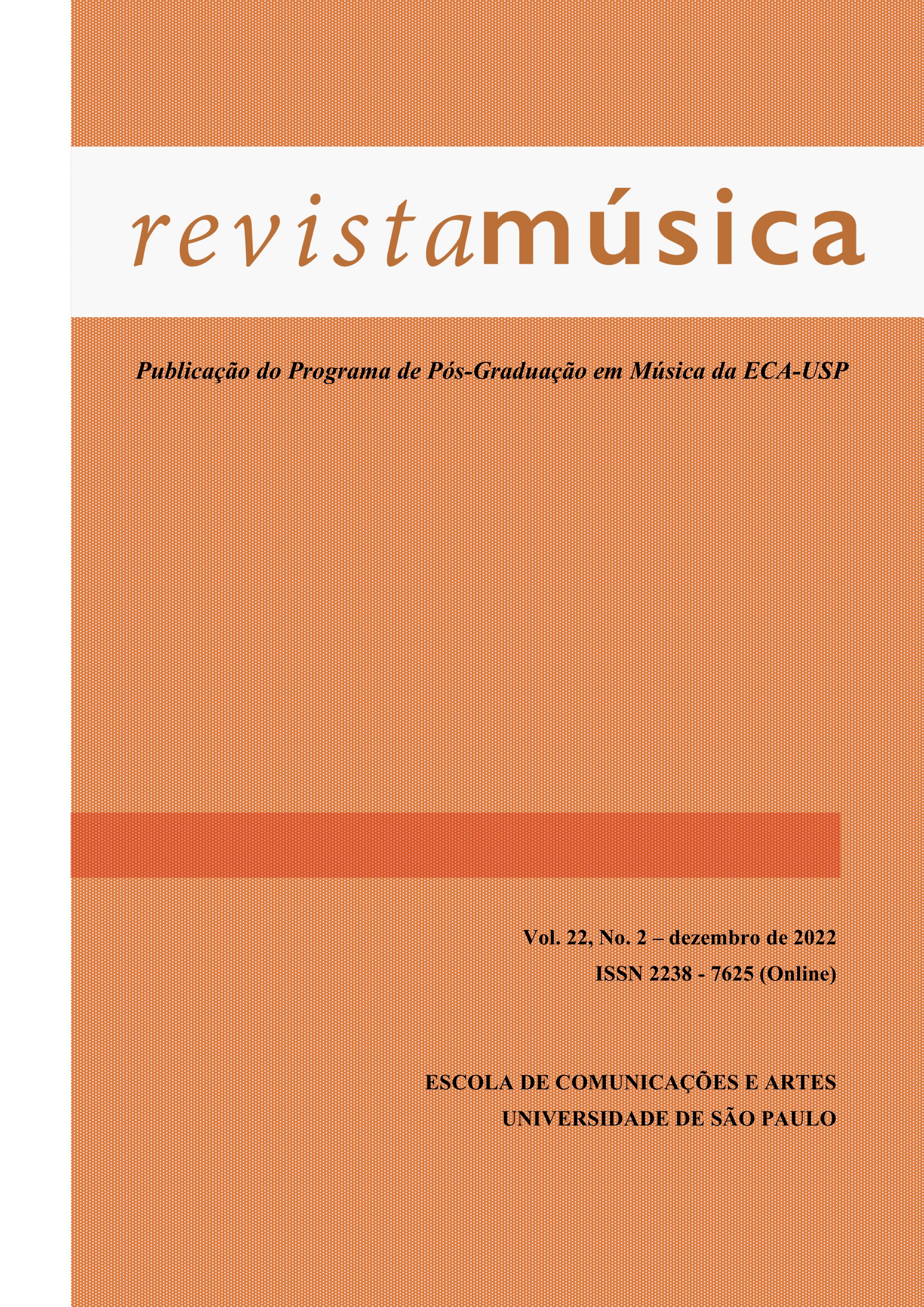Cognitive workload in orchestral performance: an integrative literature review
DOI:
https://doi.org/10.11606/rm.v22i2.203952Keywords:
Cognitive workload, Orchestra, integrative reviewAbstract
This article aims to determine how cognitive workload among participants in an orchestra is approached in the literature. Although cognitive workload is being studied in various areas of knowledge, how has the literature studied cognitive workload between participants in an orchestra? To answer this question an integrative literature review was conducted using the CAPES journals portal. From the descriptors "Cognitive workload and music" and "Cognitive workload and orchestra conducting", 51 references were identified, from which 10 were analyzed and 5 were selected because they fit the guiding question. After the analysis of the 5 selected references, the results pointed to a limitation of publications that deal specifically with the cognitive workload among the members of an orchestra.
Downloads
References
ABRAMI, Philip, BOROKHOVSKI, Eugene, BERNARD, Robert, WADE, C. Anne, TAMIM, Rana, PERSSON, Tonje, BETHEL, Edward, HANZ, Katherine, SURKES, Michael. Issues in conducting and disseminating brief reviews of evidence. Evidence & Policy: A Journal of Research, Debate and Practice, v. 6, n. 3, p. 371-389, 2010.
ALVES, Marcus Vinicius Costa. Esforço Mental e Suscetibilidade à Interferência na Recuperação da Memória Episódica, 2018. (Acesso ao documento)
ANTOINE, Maxime, BEN ABDESSALEM, Hamdi, FRASSON, Claude. Cognitive Workload Assessment of Aircraft Pilots. Journal of Behavioral and Brain Science. v. 12, p. 474-484, 2022.
BADDELEY, Alan. Working memory. Oxford: Oxford University Press, 1986.
CARMO, Fernanda Maria Almeida do, FAUSTINO, José Airton de Oliveira, LIMA, Maria Vanísia Mendonça de, FELÍCIO Milínia Stephanie Nogueira Barbosa, NETO, Hermínio Borges, CERQUEIRA, Gilberto Santos. The Didactic Contract from the Perspective of the Theory of Didactical Situations: An Integrative Review. International Journal for Innovation Education and Research. v. 8, n. 07, pp.123-134, 2020.
CAUSSE, Mickael, CHUA, Zarrin, PEYSAKHOVICH, Vsevolod, DEL CAMPO, Natalia, MATTON, Nadine. Mental workload and neural efficiency quantified in the prefrontal cortex using fNIRS. Scientific Reports, v. 7, n. 5222, 2017. DOI: 10.1038/s41598-017-05378-x .
CHAFFIN, Charles. An Examination of the Cognitive Workload Association with Conducting in an Instrumental Music Context: A Review of Literature. Bulletin of the Council for Research in Music Education, n. 189, 73-87, 2011. An Examination of the Cognitive Workload Associated with Conducting in an InstrumentalMusic Context: A Review of Literature
COORDENAÇÃO DE APERFEIÇOAMENTO DE PESSOAL DE NÍVEL SUPERIOR (CAPES) Portal de periódicos. https://www-periodicos-capes-gov-br.ezl.periodicos.capes.gov.br/index.php/sobre/quem-somos.html consultado em 3/09/2022.
DAGLIUS DIAS, Roger, NGO-HOWARD, Minhtran, BOSKOVSKI, Marko, ZENATI, Marco & YULE, S. (2018). Systematic review of measurement tools to assess surgeons' intraoperative cognitive workload. British Journal of Surgery, n. 105, 2018.
ENDESTAD, Tor, GODØY, Rolf Inge, SNEVE, Markus Handal, HAGEN, Thomas, BOCHYNSKA, Agata, LAENG, Bruno. Mental Effort When Playing, Listening, and Imagining Music in One Pianist’s Eyes and Brain. Frontiers in Human Neuroscience, v.14, 576888, 2020. https://www.frontiersin.org/articles/10.3389/fnhum.2020.576888/full
FUCCI-AMATO, Rita. A Voz Do Líder: Arte e comunicação nos palcos da gestão. Edição: Elsevier. Rio de Janeiro: Campus, 2011.
IORIO, Claudia, BRATTICO, Elvira, LARSEN, Frederick Munk, VUUST, Peter, BONETTI, Leonardo. The effect of mental practice on music memorization. Psychology of Music, v. 50, n. 1, p. 230-244, 2022. https://doi.org/10.1177/0305735621995234
JUST, Marcel, CARPENTER, Patricia, MIYAKE, Akira. Neuroindices of cognitive workload: Neuroimaging, pupillometric and event-related potential studies of brain work. Theoretical Issues in Ergonomics Science, v. 4. 56-88, 2003. 10.1080/14639220210159735.
LIMA, Jaqueline de, SIMONELLI, Angela Paula. Ergonomic activity analysis of the musicians of the Symphony Orchestra of Paraná state: Risk factors and workloads. Cadernos De Terapia Ocupacional Da UFSCar, v. 22, n. 1, p. 89-95, 2014.
SANTOS, Leila Maria Araújo, TAROUCO, Liane Margarida Rockenbach. A importância do estudo da teoria da carga cognitiva em uma educação tecnológica. Renote, v. 5, n. 1, p. 1-11, 2007. (Acesso ao documento)
SOUSA, Erverson, ALEXANDRE, Bruno, FERREIRA, Rafael, PONTUAL FALCÃO, Taciana, VESIN, Boban, GASEVIC, Dragan. Applications of Learning Analytics in High Schools: A Systematic Literature Review. Frontiers in Artificial Intelligence. v. 4, n. 737891, 2021.
SOUZA, Marcela Tavares de, SILVA, Michelly Dias da, CARVALHO, Rachel de. Revisão integrativa: o que é e como fazer. Einstein (São Paulo), São Paulo, v. 8, n. 1, p. 102-106, mar. 2010. https://doi.org/10.1590/s1679-45082010rw1134
WELLS, Robyn, ZHU, Xinhui. A Field Study on College Marching Band Players’ Workload. Proceedings of the Human Factors and Ergonomics Society Annual Meeting, v. 62, n. 1, p. 976–980, 2018. https://doi.org/10.1177/1541931218621226.
Downloads
Published
Issue
Section
License
Copyright (c) 2022 Adeline Stervinou, Henrique Pinheiro Lima, Kariny Kelvia Paiva Barbosa, Lucas Lima Chaves

This work is licensed under a Creative Commons Attribution-NonCommercial-ShareAlike 4.0 International License.
Autores que publicam nesta revista concordam com os seguintes termos:
- Autores mantém os direitos autorais e concedem à revista o direito de primeira publicação, com o trabalho simultaneamente licenciado sob a CC Attribution-NonCommercial-ShareAlike 4.0 que permite o compartilhamento do trabalho com reconhecimento da autoria e publicação inicial nesta revista.
- Autores têm autorização para assumir contratos adicionais separadamente, para distribuição não-exclusiva da versão do trabalho publicada nesta revista (ex.: publicar em repositório institucional ou como capítulo de livro), com reconhecimento de autoria e publicação inicial nesta revista.
- Autores têm permissão e são estimulados a publicar e distribuir seu trabalho online (ex.: em repositórios institucionais ou na sua página pessoal) a qualquer ponto antes ou durante o processo editorial, já que isso pode gerar alterações produtivas, bem como aumentar o impacto e a citação do trabalho publicado (Veja O Efeito do Acesso Livre).


